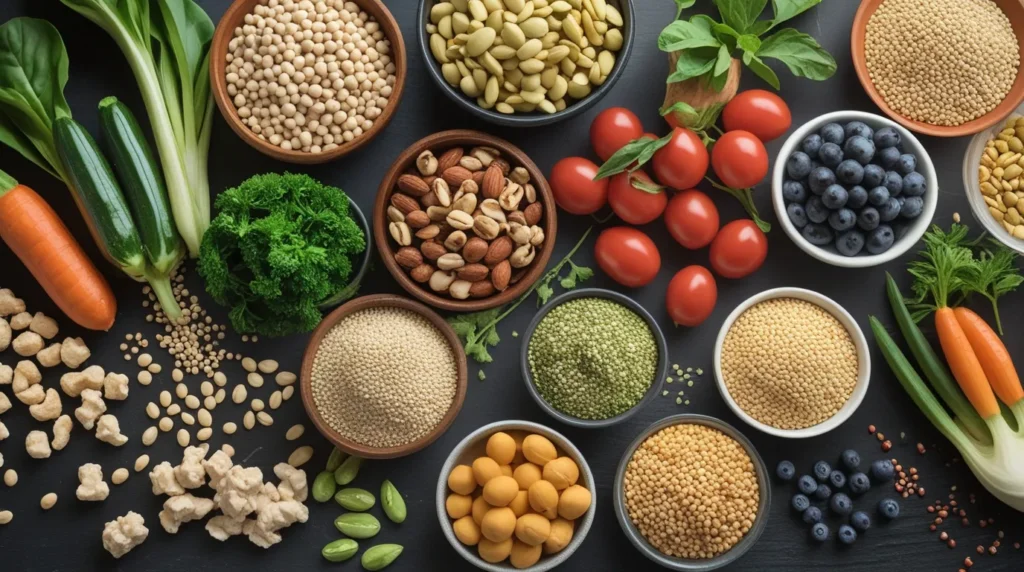Best Sources of Plant-Based Protein
Protein is an essential macronutrient that supports muscle growth, repair, hormone production, and overall body function. While animal products are well-known sources of protein, plant-based options provide excellent nutrition for vegetarians, vegans, or anyone looking to diversify their diet. Plant-based proteins are also rich in fiber, vitamins, minerals, and antioxidants, making them heart-healthy and environmentally sustainable.
Incorporating a variety of plant-based protein sources ensures that you get all the essential amino acids your body needs for optimal health.
1. Legumes: Beans, Lentils, and Peas
- Lentils: Rich in protein, iron, and fiber. Great for soups, salads, and stews.
- Chickpeas: Versatile for hummus, curries, or roasted snacks.
- Black Beans and Kidney Beans: High in protein and antioxidants; perfect for salads and chili.
- Green Peas: Can be added to rice, soups, or pasta for a protein boost.
Legumes are a staple of plant-based diets due to their high protein content and versatility.
2. Soy Products: Tofu, Tempeh, and Edamame
- Tofu: A protein-rich, versatile ingredient that absorbs flavors well in stir-fries, soups, and curries.
- Tempeh: Fermented soy product high in protein, fiber, and probiotics.
- Edamame: Young soybeans perfect as a snack or added to salads and bowls.
Soy products provide complete proteins, containing all essential amino acids.
3. Whole Grains: Quinoa, Oats, and Brown Rice
- Quinoa: A complete protein containing all essential amino acids; great for salads, bowls, and porridge.
- Oats: High in protein and fiber; ideal for breakfast or baking.
- Brown Rice and Whole Wheat: Provide moderate protein along with essential nutrients.
Grains complement legumes to ensure a balanced protein intake in plant-based diets.
4. Nuts and Seeds
- Almonds, Cashews, and Walnuts: Rich in protein, healthy fats, and micronutrients.
- Chia Seeds and Flaxseeds: High in protein, omega-3 fatty acids, and fiber.
- Pumpkin and Sunflower Seeds: Perfect for snacking or adding to salads and smoothies.
Nuts and seeds are nutrient-dense, supporting heart health and sustained energy.
5. Plant-Based Protein Powders
- Pea Protein: Easily digestible and rich in protein; ideal for shakes and smoothies.
- Hemp Protein: Contains protein and healthy fats, along with fiber and minerals.
- Soy Protein: A complete protein option for those needing a convenient boost.
Protein powders are great for supplementation, especially for athletes or busy lifestyles.
6. Vegetables with Higher Protein Content
- Spinach, Kale, and Broccoli: Contain moderate protein and abundant vitamins.
- Brussels Sprouts and Asparagus: Protein-rich and versatile in cooking.
- Mushrooms: Provide protein and enhance the flavor of meals.
Vegetables may not have as high protein as legumes but contribute to overall intake while adding fiber and nutrients.
7. Other Plant-Based Protein Sources
- Seitan: Made from wheat gluten; high in protein and great in savory dishes.
- Nutritional Yeast: Adds protein and a cheesy flavor to meals.
- Spirulina: A blue-green algae packed with protein and essential nutrients.
Exploring diverse sources ensures you meet protein needs while enjoying varied flavors and textures.
Final Thoughts
Plant-based protein is not only beneficial for health but also environmentally sustainable. By incorporating legumes, soy products, grains, nuts, seeds, and high-protein vegetables, you can meet your daily protein requirements without relying on animal products. Combining different protein sources ensures you get all essential amino acids, supporting muscle growth, energy, and overall well-being.
Whether you are vegan, vegetarian, or simply looking to add more plant-based options to your diet, these protein-rich foods provide nourishment, versatility, and taste. With careful planning and variety, plant-based protein can power your body efficiently and deliciously.


